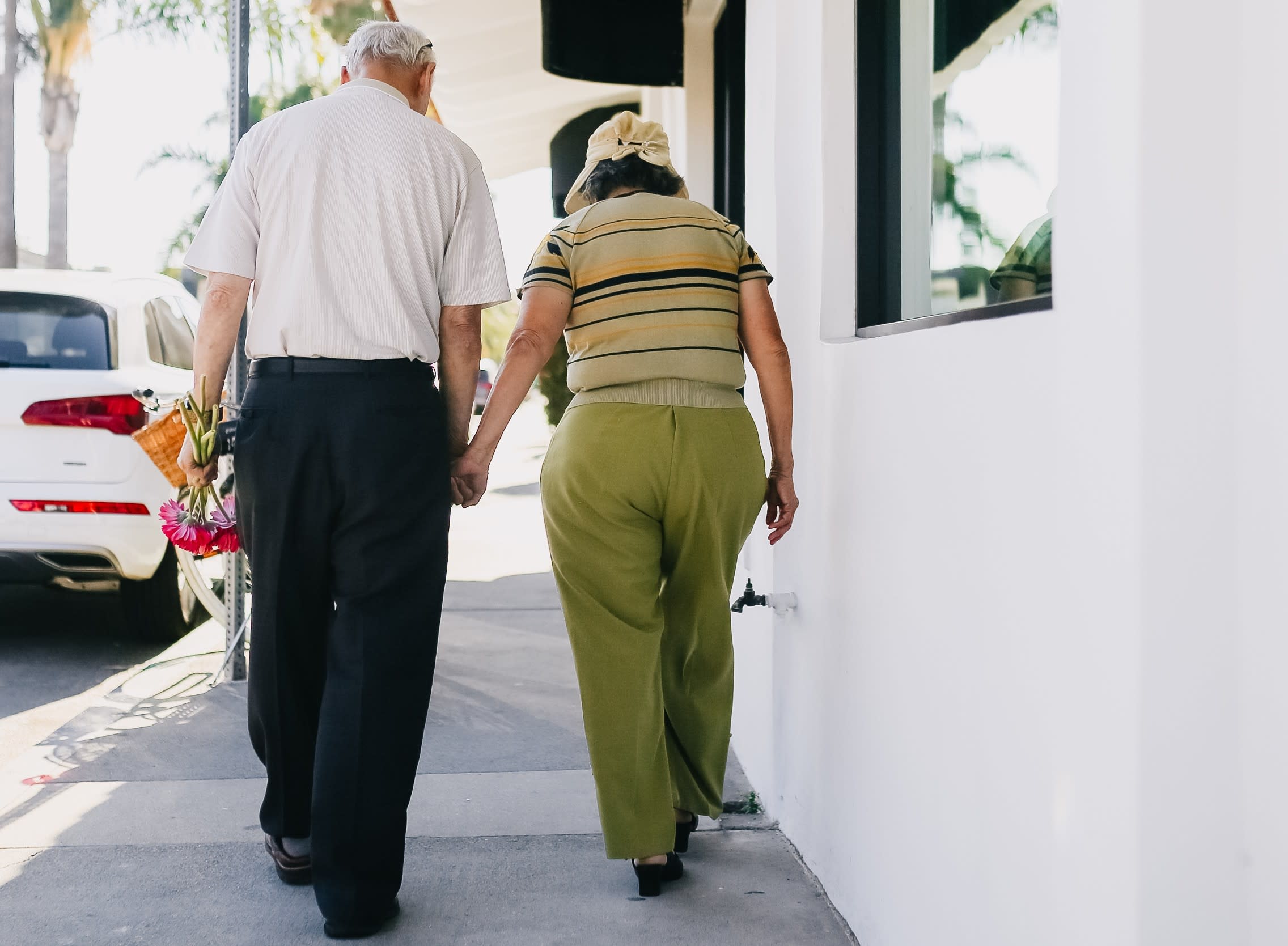More younger adults planning end-of-life care during Covid-19 crisis, one healthcare provider sees 8-fold jump in a year
SINGAPORE — Talking about and planning for one’s end-of-life care can be difficult, especially when death is still very much a taboo topic among many people in an Asian society such as Singapore. For 28-year-old Jasmine Goh, who is young and in good health, she was made to think about her own end-of-life arrangements after some of her relatives died last year.

- More young adults are making end-of-life arrangements
- This is possibly due to the Covid-19 pandemic and more people getting chronic illnesses at a younger age
- Healthcare provider Sata CommHealth said it saw an increase in people who registered for an LPA and carried out advance care planning in the past year
- A 28-year-old talked about her experience registering an LPA and why she is taking end-of-life conversations seriously at her age
- Sata CommHealth and MSF gave advice on what to consider when making an LPA and advance care planning
SINGAPORE — Talking about and planning for one’s end-of-life care can be difficult, especially when death is still very much a taboo topic among many people in an Asian society such as Singapore.
For 28-year-old Jasmine Goh, who is young and in good health, she was made to think about her own end-of-life arrangements after some of her relatives died last year.
A few months ago, Miss Goh registered her Lasting Power of Attorney (LPA) and completed advance care planning at Sata CommHealth. The charitable organisation is one of the healthcare providers here that offers a one-stop service for both procedures.
Advance care planning is a series of conversations to help people discuss and plan for their future health and personal care needs in the event that they are unable to make such decisions for themselves in the future.
The conversation will let people talk about their personal values and beliefs, and let loved ones understand how these will affect their healthcare preferences in different medical circumstances.
An LPA is a legal document that allows a person to appoint one or more people aged 21 and above to make decisions and act on his or her behalf to manage welfare, property and affairs if he or she loses mental capacity in the future to make decisions.
Anyone aged 21 and above can make an LPA.
Ms Goh, a manager, said: “Based on my past experiences, I saw that it was difficult and stressful for my relatives to settle certain things, like banking and administrative matters, without an LPA in place when their loved one could no longer respond.
“Nobody wants it to happen but when the time comes, you would want to spend more time taking care of your loved one rather than handling administrative issues.”
INCREASE IN YOUNGER ADULTS GETTING AN LPA
Ms Goh is among a growing group of young adults in Singapore who have registered their LPA since the start of the Covid-19 pandemic.
Sata CommHealth saw an eightfold increase — from six last year to around 49 this year — in the number of people aged 50 and under who registered their LPA and did advance care planning.
The number of adults above 50 has also gone up from 147 in 2020 to 380 in 2021.
The Ministry of Social and Family Development (MSF) said that it has seen significantly more LPAs registered in the first half of this year compared to the same period last year and in 2019.
There were about 21,000 registered LPAs in the first six months of 2021.
This is a 202 per cent increase from the 7,000 or so who registered in the first half of 2020 and about a 93 per cent increase from 10,800 or so who did the same in the first half of 2019.
Younger adults under 50 make up nearly a quarter (about 23 per cent) of the total number of people who registered their LPAs between 2019 and June 2021.
The Office of the Public Guardian, which is a division of MSF, maintains a register of LPAs and carries out various functions towards enabling and protecting persons who lack the capacity to make decisions.

Mr Sherman Chan, head of community programmes at Sata CommHealth, observed that younger adults who take up an LPA understand the importance of end-of-life arrangements. Some also take their older parents along to complete the service.
Besides greater awareness on the issue, the higher take-up rate could also be due to a change in perceptions around end-of-life arrangements over the past two years.
MSF told TODAY: “Covid-19 has underscored the fragility of life, especially when a loved one may suddenly be plunged into a precarious state of ill health and may require someone to look into their well-being.
“It has also led many individuals to pre-plan with an LPA and appoint a person they trust to make decisions on their behalf when they are mentally incapacitated. This gives their families peace of mind and allows them to focus on caring for them.”
Mr William Hoo, a case manager at Sata CommHealth, said that people are now more aware of mortality, especially during the pandemic.
More people are also getting chronic illnesses such as hypertension, diabetes, dementia and stroke at a younger age.
“Given the uncertainties, an LPA and advanced care planning allow an individual to plan for those unexpected situations,” he said.
HURDLES TO PREPARING FOR FUTURE
Despite the higher take-up rate, getting loved ones to think about and make plans for one’s end-of-life care continues to be a tough sell in Singapore.
A study conducted over a period of five weeks from August this year by Singapore Management University (SMU) students revealed that despite keeping a watch on the number of deaths due to the Covid-19 pandemic, only five in 10 Singaporeans are open to discussing end-of-life plans with their loved ones.
This is compared to 97 per cent indicating that they would plan for marriage and 93 per cent indicating that they would plan for births.
The study interviewed more than 5,000 people across various generations, including millennials, Generation X and baby boomers.
Ms Goh feels that the notion of death or just thinking about what to do when a life-threatening illness strikes is “pantang” (taboo in Malay) in the Asian culture.
“Some people don’t want to talk about it, but just in case something does happen, I think it’s important (to have an LPA and advance care planning in place).
“This is especially if you have a family history of a medical illness. You never know when things may happen,” Ms Goh added.
“I also think there is lesser burden on the family when they are caring for you when you’re ill.”
“If the person loses mental capacity and did not make an LPA but is still living, then his or her bank account, CPF account, property, etc, is ‘stuck’ unless a family member applies through the court to... manage (these)Mr William Hoo, case manager at Sata CommHealth”
Mr Hoo from Sata CommHealth explained that advance care planning takes effect when the person is diagnosed with a serious illness or loses mental capacity and is unable to communicate his or her medical care preferences.
The healthcare and personal care preferences would have been discussed and recorded earlier by a trained advance care planning facilitator to enable the patient’s nominated healthcare spokesperson to be his or her voice when mental capacity is gone.
“By making their wishes known on record, their loved ones, caregiver and medical personnel do not have to guess what patients might want or not want,” Mr Hoo said.
Like advance care planning, the LPA kicks in when one loses the mental capacity to make a decision but is still living. It is a legal document once it is registered with the Office of Public Guardian, Mr Hoo said.
DEBUNKING MISCONCEPTIONS
Misconceptions about end-of-life arrangements such as an LPA may be why some people are caught unawares when a serious illness strikes and they lose mental capacity to make decisions for themselves.
A common misconception is that making a legal will is enough to cover all bases.
MSF said: “People tend to overlook the fact that a will only takes effect when the testator (person who made it) passes away, unlike an LPA which is only effective during the lifetime of the donor (person who registers the LPA).”
The ministry also said that the executors or beneficiaries of a will cannot make decisions on behalf of the testator when the latter is alive, but a donee can if the donor has lost mental capacity.
A donee refers to the person appointed by a donor to make decisions and act on his or her behalf on personal welfare, property and affairs matters in the event that the donor loses mental capacity one day.

Another mistaken notion is that end-of-life planning is only for people who are of advance age, are critically ill or dying.
“This is not true as mental incapacity can occur at any life stage due to accidents or sudden onset of illnesses,” MSF said.
The spouse or family members may also think that they are able to make financial decisions or be able to agree on decisions on behalf of a person who loses mental capacity because of their kindred relationships.
However, this is not the case.
Mr Hoo from Sata CommHealth pointed out that people who already lack mental capacity due to an accident, dementia or Alzheimer’s disease for example, cannot make an LPA.
He explained: “If the person loses mental capacity and did not make an LPA but is still living, then his or her bank account, Central Provident Fund account, property, etc, is ‘stuck’ unless a family member applies through the court to be the deputy to manage the person’s welfare, affairs and property.
“They must engage a lawyer and the process takes a long time.” This is because it would involve having the related family members or parties go through legal procedures before officially finalising the outcome.
“There may also be quarrels or lawsuits among family members as to who should be the one entrusted to manage the money or property.”
MSF said that third parties, including other family members, cannot override the actions and decision of a validly appointed donee.
However, third parties or a public guardian can apply to the court to challenge the decision of the donee or seek to have the donee removed from the appointment if there is evidence to show that the donee has behaved, may be behaving or is proposing to behave in a way that would contravene his or her authority or is not in the best interests of the mentally incapacitated donor.
An LPA can be declared by the court to be invalid if it can be proven that at the time it was made, the donor did not have mental capacity, there was fraud or undue pressure used to induce the donor to make the LPA or there existed some other matter that prevents the LPA from being legally created.
MSF said that to date, there have been a few cases of LPAs being revoked and the donees removed from their appointments:
- A notable and well-publicised case of an LPA being revoked is the 2014 case involving Yang Yin, a former tour guide from China who was jailed for cheating a wealthy widow, Madam Chung Khin Chun, who had appointed Yang as her donee in 2012.
- In another 2014 case, an LPA was revoked because the donor’s signature was not properly witnessed by the certificate issuer.
- This year, the court revoked an LPA when it found that the donor, who was suffering from dementia, had made it under the undue influence of the done
What to consider when making a Lasting Power of Attorney
MSF said that anyone who is above 21 years old and has the mental capacity can decide to make an LPA. It is a voluntary decision that is done with no undue influence or under duress.
For those thinking of making an LPA, Mr Hoo from Sata CommHealth suggested considering the following when choosing one or two donees:
- Who do you trust to manage your money or property?
- Does the person understand you, know your preference, is willing to take on the responsibilities and make decisions under stressful circumstances?
- Is the person able to manage their personal finances?
- Is the person able to act in your best interest?
When broaching the topic of end-of-life arrangements with loved ones, Mr Hoo said that family members may use newspaper articles, experiences of a friend or relatives facing severe illness or even relatable examples from television drama series to kickstart the conversation.
There are also a number of LPA and advance care planning resources and videos available online.
For Ms Goh, the process of planning her own end-of-life arrangements helped her to bring up the topic with her parents.
She took her mother along to register for an LPA and advance care planning each at one of Sata CommHealth’s medical centres.
Before their appointment, they attended a webinar to learn more about the topic. Her father has not completed the process but plans to do so.
“I think it’s good to experience it with your parents because that may motivate them to do it, too,” Ms Goh said.
“If my mum had to do the advance care planning and LPA on her own, I think she would be confused. Being there with her helped.”
Mr Chan from Sata CommHealth said that an LPA can be signed by a certificate issuer such as an accredited doctor, psychiatrist and practising lawyer. Advance care planning is carried out by a trained facilitator.
Ms Goh said that the session for her and her mother took around three hours.
“It will take some time because there’s quite a bit of documentation. But it’s a one-time ‘pain’ and you’ll be covered should anything — touch wood — happens in the future,” she added.






